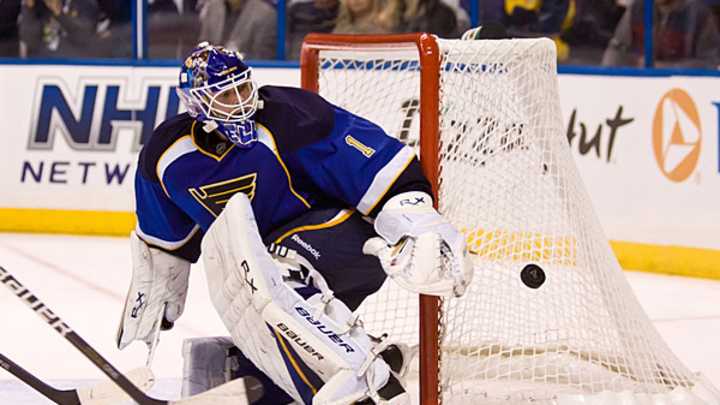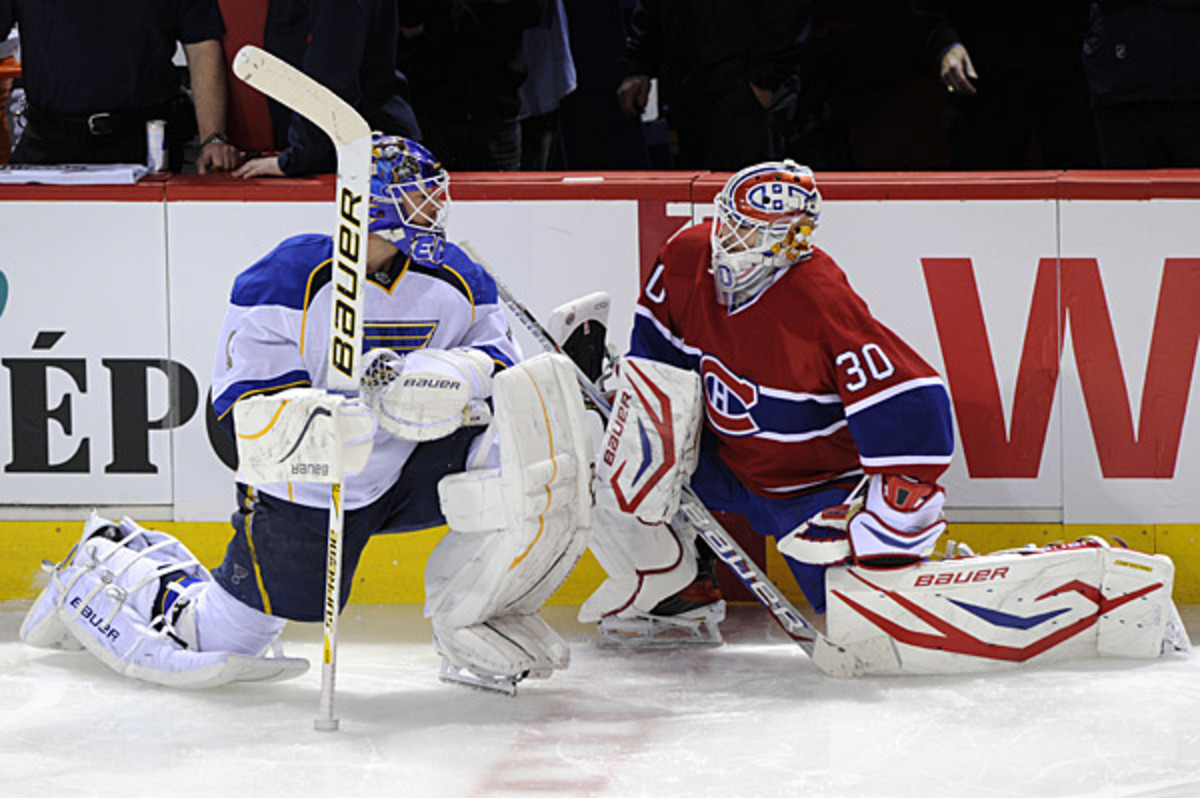Taking stock of goaltending

Goalies can be like Mama Gump's box of chocolates -- you never know what you're gonna get -- and that's been very true for the St. Louis Blues with Brian Elliott (left) this season. (Minas Panagiotakis/Icon SMI)

By Stu Hackel
The news from St. Louis that the Blues have rewarded Brian Elliott with a two-year contract extension sparked a few thoughts about goaltending in general and the Blues in particular.
There is no official NHL award for comeback player of the year, and even if there was, Elliott might not actually be a good choice because his earlier incarnation as a goalie for the Ottawa Senators produced only one good season (29-18-4, 2.57 goals-againt average and .909 save percentage with five shutouts in 2009-10) and a few not so good ones. But his work so far this season (15-5-1, 1.68 and .937) has him swimming with the big fish of NHL netminders, namely The Bruins' Tim Thomas, the Predators' Pekka Rinne and the Rangers' Henrik Lundqvist. (SI.com's Michael Farber looked at Elliott's emergence in a recent column.)
That trio is usually named when talk turns to the league's best goalies, probably because they're established and have been Vezina nominees, with Thomas having won it twice. Two of their teams are battling for first place overall and play in Original Six markets. Among them, only Thomas has had real playoff success, playing his best at the game's highest level.
But any list of top-tier NHL goalies really must be broader and include a few guys who have played consistently very well for a few seasons, are playing well now, and deserve greater recognition. We're thinking specifically of the Kings' Jonathan Quick and the Red Wings' Jimmy Howard, both of whom have grown steadily during their first few NHL campaigns. If the Wild's Niklas Backstrom isn't right alongside them, he's very close, but plays for a team that often struggles to provide him with the offensive support that translates into victories.
Two other guys might deserve some consideration -- The Bruins' Tuukka Rask and the Canucks' Cory Schneider. Both have excelled this season, but are playing behind Thomas and Roberto Luongo respectively. The big contract that Vancouver gave Luongo, whose play is perpetually hot and cold, has a lot to do with why he gets most of the starts. In Rask's case, he's clearly the Bruins' netminder of the future. Of course, the 36-year-old Thomas shows no signs of slowing down. Both Rask and Schneider would be the top goalies on many other teams.
Besides Luongo, there are some others who have been paid like elite performers but haven't performed like it. The human Injured Reserve List, Rick DiPietro (check out his painful saga in photos here) comes immediately to mind, as does the telegenic Ilya Bryzgalov. The Islanders and Flyers have these guys on their payrolls until the 23rd Century, it seems, and may never have much to show for it. In this week's edition of Sports Illustrated, Michael Farber addressed the difficulties of trying to find a reliable goaltender.
Now, there are a few elite goalies whose play has dropped off this season. The Sabres' Ryan Miller is having a down period -- and since his Vezina Trophy/Olympic MVP campaign of 2009-10, doesn't seem to be the same netminder. We've speculated before that he could be just worn out. Miller is not a big guy and has played a lot. He's also been injured a lot during the past two years. NBC and SI analyst Pierre McGuire has wondered if Miller has ever recovered mentally and emotionally from giving up the gold medal goal in the Vancouver Games to Sidney Crosby. It's possible.
The Ducks' Jonas Hiller was also in this elite discussion until about a year ago. That's when he began experiencing mysterious vertigo symptoms that forced him to miss almost all of last season's second half. He hasn't been anywhere near as consistently good this season. It's possible that the long layoff is responsible for that. Ken Dryden, who was the best goalie of the 1970s, sat out the 1973-74 season in a contract dispute with the Canadiens (and to pursue his law degree) and while he was good in his first season back, he was not at his best. That form didn't return until 1975-76.
You could add a couple more names to the list of goalies who have been having less than stellar 2011-12 campaigns. Cam Ward annually kept his Hurricanes in the playoff hunt despite their usual injuries and thin roster. Not this season. The same can be said for the Canadiens' Carey Price. Both are surrendering too many goals that they would have stopped in the past.
A few veteran netminders have made unexpected comebacks: Florida's Jose Theodore, Washington's Tomas Vokoun, Ottawa's Craig Anderson and Colorado's J-S Giguere may not be hitting the heights they did at other points of their careers, but they've been quite good at times nonetheless. Whether they'll be able to sustain their current levels is uncertain. Last season's big comeback star, Dwayne Roloson, hasn't been able to duplicate his excellence. The Lightning were one of the NHL's surprises last season because of him, but the decline in his play, at 42 years old, has been obvious to all.
The greatest generation of NHL goalies, from the last part of Original Six era, played well into their 40s and continued to excel. Hall of Famers all, Jacques Plante, Glenn Hall, Gump Worsley, Johnny Bower and Terry Sawchuk all had elongated careers. The position and the game were radically different five decades ago and it has become incredibly rare for a goalie in his 40s, like Roloson, to post successive superb seasons.
One elite goalie we thought might hit 40, Marty Brodeur, has been slipping for a couple of years. He can't be considered in that top grouping any longer. Of all the contemporary netminders mentioned in this post, he's had the most outstanding career. Some consider him the best ever and he's got the stats to prove it. But with a save percentage that is shockingly below .900, the 39-year-old Devils mainstay is now dividing playing time with Johan Hedberg. Brodeur said this week that he's thinking about playing again next season, and his relationship with GM Lou Lamoriello may permit that. We'd never discount a great talent like Brodeur's from bouncing back, but his career arc is not trending that way.
The Stars' Kari Lehtonen and the Coyotes' Mike Smith are both having strong seasons, but we'd need to see a few years of consistency from them, if not some playoff success, to have them join the elite grouping.
And that brings us back to Elliott and his creasemate Jaroslav Halak. We'll need more time to adequately judge them, too, but they've been essential in the Blues' rise in the West. A good chunk of credit for that goes to the team's goalie coach, Corey Hirsch. Both Elliot and Halak had big problems in Ottawa and Montreal respectively with their rebound control, but under Hirsch they seem to have corrected them. Hirsch is also working with Ben Bishop, who was just named to the AHL All-Star team while playing for the Blues' affiliate in Peoria.
It also helps Halak and Elliott that the Blues under coach Ken Hitchcock play a sharp team defense game. St. Louis surrenders the fewest average shots per game in the league and, if you've watched the Blues lately, they know how to keep shooters away from dangerous areas on the ice.
Halak, who showed that he was capable of performing at a very high level in the '09 playoffs, has never demonstrated that he could play a long stretch of games without wilting, so partnering with the equally capable Elliott might be an ideal situation for him and the Blues.
"Our depth at goaltender has never been stronger," GM Doug Armstrong told Norm Sanders of the suburban Bellville News-Democrat. "With the rigors of an NHL season and the travel and the importance of the points, having two good goaltender is paramount. I believe right now we have one of the best tandems in hockey and moving forward with their age, that's going to continue."
The extension that Elliott signed (two years, $3.6 million) combined with Halak's deal ($3.75 million per season, also through 2012-13) means that St. Louis will pay $5.5 million in goalie salary each of the next two seasons. By comparison, Vancouver's Luongo and Schneider will make a combined $6.3 million this season. Boston's Thomas and Rask will pull in $6.2 million.
"The teams that have shared goaltending duties toward the break, their starters aren't tired and their team is still energized," Hitchcock told Jeremy Rutherford of The St. Louis Post-Dispatch. "We've won a lot of close games because the goalies have been energized to make the right save at the right time."
Armstrong also lauded Elliott's qualities as a popular teammate. "Watching his relationship with Jaro grow," he said. "I think there's great competition and a great comfort level for both those guys."
An Elliott-Halak tandem was not what the Blues envisioned last summer; Elliott wasn't even penciled in as the backup. That job was going to be big Ben Bishop's. Elliott won the job -- just barely -- in training camp and now has the best stats among all goalies who have played at least 20 games. Meanwhile, St. Louis has allowed the fewest goals among all Western Conference teams.
"In today's NHL, with compacted game schedules and travel and the importance of every point, our belief is that you need two quality goaltenders," Armstrong said. "It was important for us to have a good tandem and I think we have that. We have two guys who can play lots of games.
With Elliott's new deal, the Blues are taking care of their present and their future .
COMMENTING GUIDELINES: We encourage engaging, diverse and meaningful commentary and hope you will join the discussion. We also encourage, but do not require, that you use your real name. Please keep comments on-topic and relevant to the original post. To foster healthy discussion, we will review all comments BEFORE they are posted. We expect a basic level of civility toward each other and the subjects of this blog . Disagreements are fine, but mutual respect is a must. Comments will not be approved if they contain profanity (including the use of punctuation marks instead of letters); any abusive language or personal attacks including insults, threats, name calling, harassment, libel and slander; hateful, racist, sexist, religious or ethnically offensive language; or efforts to promote commercial products or solicitations of any kind, including links that drive traffic to your own website. Flagrant or repeat offenders run the risk of being banned from commenting.
